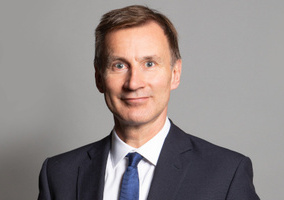Charity sector infrastructure bodies have criticised chancellor Jeremy Hunt’s autumn statement for its lack of measures to support voluntary organisations.
NCVO, the Charity Tax Group (CTG) and the Chartered Institute of Fundraising (CIoF) all said there could have been more support for charities in the statement.
Meanwhile, Pro Bono Economics (PBE) estimated that the charity sector’s income would be £9bn lower than the pre-Covid trend, based on figures published today by the Office for Budget Responsibility (OBR).
NCVO: ‘Today’s autumn statement is a blow for charities’
Sarah Vibert, chief executive of NCVO, said: “Today’s autumn statement is a blow for charities. Despite the backing of more than 1,400 charities, our call on the chancellor to address chronic underfunding of public services was overlooked.
“Not uplifting grants and contracts to cover the true cost of delivering them means some charities will be forced to close or reduce the services they offer, leaving people at risk.
“We’ve been working tirelessly with the sector to warn of what will happen if the sector’s cost of giving crisis isn’t addressed. We will continue to call for the necessary changes to public service funding to help secure the long-term future of public services, and make sure people can still access vital support where and when they need it.
“We owe it to our members, charities across the country, and the communities we all serve, to keep calling for change. And we won’t stop until our ask is heard, and action is taken.”
CTG: ‘Lack of acknowledgement a disappointment’
Richard Bray, CTG chair, commented: “While recognising that the chancellor’s priority was to stimulate growth and support business, we had hoped that the autumn statement would have contained at least some measures to help charities, many of whom are struggling to maintain the services on which many depend.
“Along with others, CTG had argued for the introduction of some simple and inexpensive reforms, particularly in relation to goods donated by businesses to charity. Their absence and the general lack of acknowledgment of charities is a significant disappointment.
“In the longer term, we hope that the measures announced today will help to alleviate the pressures that many feel and will also ease some of the pressures that charities currently face and that the chancellor will include measures to support charities in the spring budget.”
CIoF: ‘Support for charities was largely forgotten’
Charlotte Sherman, growing giving policy and partnerships manager at CIoF, said: “It was positive to see the government provide funding to fight antisemitism, support apprenticeships and boost levelling up.”
“But in an autumn statement focused on growth and productivity, it felt like support for charities was largely forgotten at a time when services are under pressure.
“The government needs to understand that charities play an integral role in helping them reach their goals and build a stronger economy.
“We want to see government develop a fiscal and economic environment that allows charities to grow, both through the recommendations of the Civil Society Group and policies that encourage charitable giving.”
PBE: ‘The sector has already been running hot’
Matt Whittaker, CEO of PBE, said: “The combination of continued stagnation in incomes and real-terms cuts in public services is likely to fall heaviest on the people who have already been most exposed to the economic and health challenges of recent years.
“The nation’s charities will undoubtedly step in to support this group at the sharp end, as they have done through a succession of recent crises.
“The charity sector has already been running hot while dealing with the triple threat of elevated demand, higher costs and falling donations. This precarious balancing act is set to continue.
“Based on the OBR’s figures, we project that charity sector income is likely to be £9bn lower than the pre-Covid trend.
“Beyond the here and now, it is critical that after 20 years of anaemic growth, the focus moves to thinking about wider structural changes, considering the vital part charities have to play in those plans.”
NPC: ‘Charities are facing increases in demand’
New Philanthropy Capital chief executive Dan Corry said: “Everyone in the social sector will be relieved at the increases in benefits and minimum wage. Charities are facing increases in demand across the country, and these will ease the pressure in the short-term.
“But there were no major announcements for health, education, or justice – the issues and services that charities care about the most. And nothing about reducing pressures on the local government budgets that much of the third sector relies on.
“In the long-term, current economic plans still include large-scale national spending cuts in future years. It’s vital that charities take an active part in the next election campaign and speak up for how this could affect their users.”
Locality: ‘Announcements will not solve underlying issues’
Locality’s director of policy Ed Wallis, said: “In an effort to make the economy stronger, the chancellor has reached for the usual election year tools. But headline-grabbing announcements on taxes and benefits will not solve the underlying issues in our society.
“Whether it’s helping people into work, leading the way on net zero, or tackling inequality, it’s local people not Westminster politicians who have the answers.
“Yet instead of shifting power and resources to local people, successive governments have continued to rely on the levers in Whitehall. If the chancellor really wants to unlock the potential of people across the country, he should take the leap and kickstart a community power revolution.”
VODG: ‘Government failed to provide financial security’
Rhidian Hughes, chief executive of the Voluntary Organisations Disability Group said: “Today's Autumn Statement was another missed opportunity to provide a surer footing for social care and the growing number of people who rely on social care support.
“While the increase in the national living wage is a welcome announcement, it is yet to be seen whether the commitment will be fully funded or add even more pressure to already stretched services.
“At a time when charities are having to chase local authorities and the NHS to pay for agreed upon contracts, and are forced to decide between cutting essential provision or handing back contracts, the government has failed to provide the financial security the sector so desperately needs.
“We must safeguard services for disabled people if statutory requirements are to be met. To keep ignoring the problem fails millions of people who deserve better.”
DSC: ‘Some good, some bad and some downright ugly measures’
Jay Kennedy, director of policy and research at the Directory of Social Change, published a blog on the Statement.
He wrote: “There were some good, some bad and some downright ugly measures in the statement that charity staff, volunteers and trustees will want to take note of.”
The blog adds: “These ‘fiscal events’ always involve a good dose of financial fiction, and this was no exception. The National Insurance cut offers some tangible benefits in the near-term, but other measures indicate that various charity campaigns to advocate for those suffering in the cost-of-living crisis will be even more important in the election year.
“Ultimately, this statement was mostly about setting the scene for a General Election campaign in spring or autumn of 2024, with some dividing lines staked out on tax cuts, benefits and business support. But many of the policy details will likely wither on the vine or disappear completely afterwards, even if the macro-economic impact of the decisions taken or not taken remains.”
Related Articles












